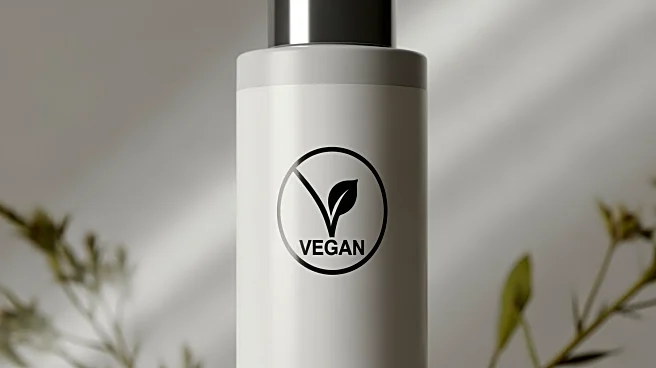What's Happening?
The beauty industry is facing scrutiny over self-certification of vegan products, as consumers increasingly demand third-party verification. The Vegan Trademark, established by The Vegan Society in 1990,
is recognized as a reliable certification, with over 70,000 products certified globally. A recent survey by The Vegan Society and Vypr revealed that 68% of British shoppers trust the Vegan Trademark more than self-declared vegan logos. The survey also found that 60% of consumers would not purchase from a brand again if they discovered a product was falsely labeled as vegan. This highlights the importance of independent certification in maintaining consumer trust and ensuring product integrity.
Why It's Important?
The demand for vegan and cruelty-free products is growing, driven by consumer awareness and ethical considerations. Brands that fail to provide credible vegan certification risk losing consumer trust and facing backlash. The Vegan Trademark serves as a beacon of trust, not only for vegan consumers but also for those seeking ethically sourced products. As the market for plant-based and cruelty-free beauty products expands, third-party certification becomes a business imperative, ensuring transparency and accountability. This shift reflects broader consumer trends towards sustainability and ethical consumption, impacting brand loyalty and market positioning.
What's Next?
As consumer demand for transparency and ethical practices continues to rise, more beauty brands may seek third-party certification to maintain competitiveness. The Vegan Society's rigorous standards could become a benchmark for the industry, influencing regulatory developments and consumer expectations. Brands may need to invest in supply chain transparency and reformulation to meet certification requirements, potentially leading to industry-wide changes in product development and marketing strategies.
Beyond the Headlines
The emphasis on third-party certification highlights a broader cultural shift towards accountability and ethical consumption. This trend may extend beyond the beauty industry, influencing other sectors to adopt similar practices. The role of consumer advocacy in shaping industry standards underscores the power of informed purchasing decisions in driving corporate responsibility and sustainability.









